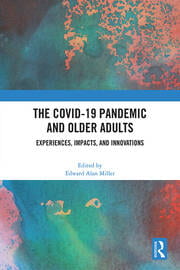Policymakers, researchers, and practitioners will gain insights from a new collection of original research and perspectives on the ramifications of COVID-19 for the older adult population. The COVID-19 Pandemic and Older Adults: Experiences, Impacts, and Innovations (Taylor & Francis Publishing, April 2022) collects 17 articles which first appeared in a 2021 double edition of the Journal of Aging & Social Policy.
“We are at a point in the pandemic where we can draw important lessons for subsequent waves of the virus and for future pandemics, particularly around mitigating the devastating effects on older adults,” says the book’s editor, Edward Alan Miller, PhD, who edits the Journal of Aging & Social Policy and chairs the Department of Gerontology at the University of Massachusetts Boston. “COVID-19 obviously had a terrible impact on vulnerable segments of the older adult population, both in terms of mortality and morbidity but also in terms of isolation and loneliness, adverse economic effects, and revealed ageism. COVID-19 also shined a spotlight on chronic challenges facing the aging care sector. We need to fully understand the myriad ways in which the pandemic affected older adults, their families, communities and caregivers, to chart a better path going forward.”
The book’s chapters focus on four general areas of inquiry. Six chapters focus on personal experiences with COVID-19, primarily in relation to community-dwelling older adults but also with respect to family caregivers in formal care settings. Five chapters address the impact of COVID-19 on long-term care, mainly with respect to nursing homes in the United States and overseas. Two chapters focus on end-of-life care during the pandemic. Five chapters focus on technology and other innovations emerging from the crisis.
The new book follows up on an earlier volume, Older Adults and Covid-19: Implications for Aging Policy and Practice, also drawn from a double edition of Journal of Aging & Social Policy and published in early 2021.


Leave a Reply